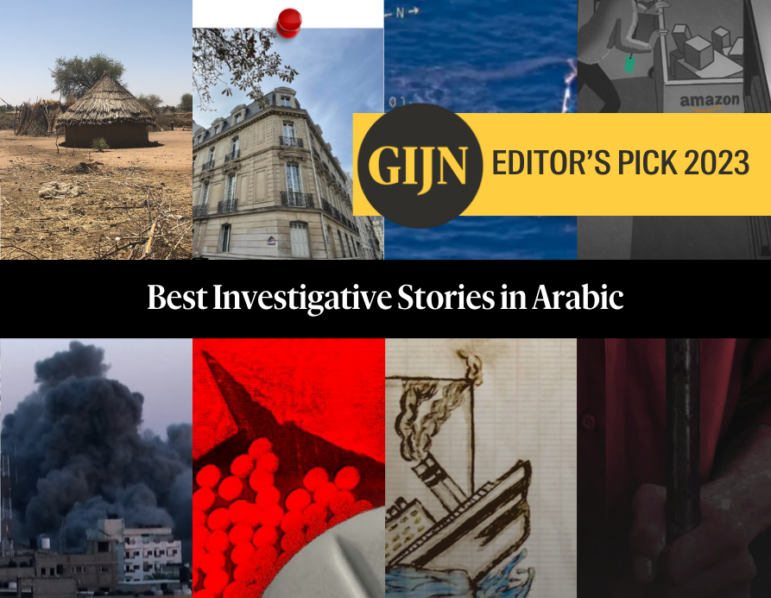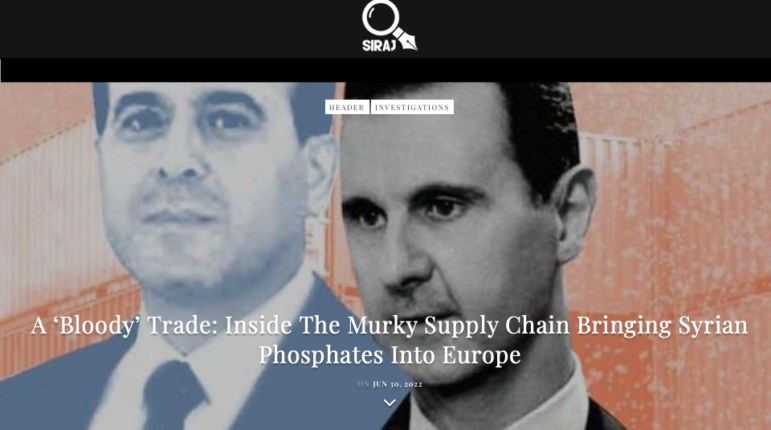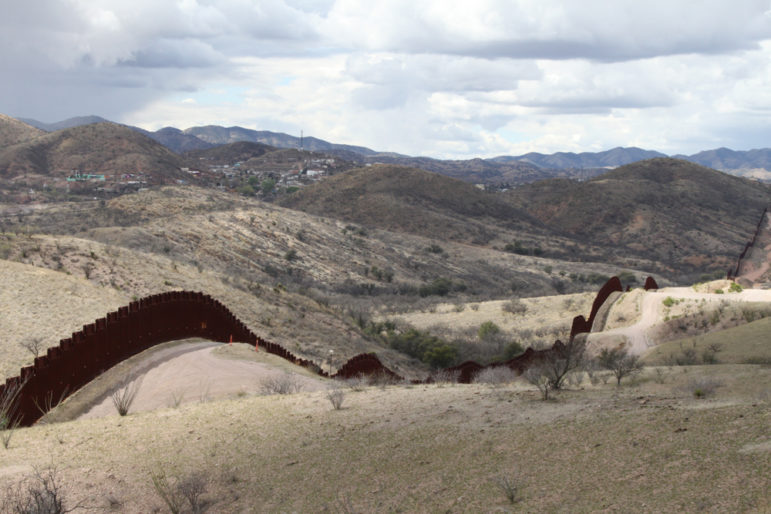

Syrian Drug Trafficking, Deadly Migration, Daily Struggles in Gaza: 2023’s Best Investigative Stories in Arabic
The investigative journalism community in the region and across the globe was deeply shocked and saddened by the recent war on Gaza. Since the start of the conflict, journalists have been targeted in a brutal manner, with at least 68 journalists and media workers killed, according to the Committee to Protect Journalists (CPJ). During the Israeli ground assault, journalists in Gaza have faced exceptionally high risks, including devastating airstrikes, disrupted communications, shortages of supplies, and extensive power outages. The emotional and mental trauma of covering this war has affected the whole journalism community in the region, including investigative journalists.
In addition to the perilous conditions for journalists in Gaza, press freedom is slowly being strangled in the Middle East and North Africa. When journalists expose truths that are inconvenient to powerful actors, they are harassed, imprisoned, and even beaten. Also, there is often a lack of funding, information access, and training resources.
Despite all this, glimmers of hope persist amid these stark realities. Tenacious journalists press on, collaborating across borders and leveraging international support. GIJN members, and the broader community within the region, continue to seek opportunities to work together and report on environmental pollution, corruption, and human rights abuses.
As 2023 draws to a close, we present a collection of the year’s most impactful investigative journalism from the MENA region, showcasing the relentless work of our community through these exemplary stories. While many great stories remain untold, these choices highlight the innovation, perseverance, and critical importance of Arab journalists’ work.
‘Kill Us or Send Us Home’: Amazon Workers Exploited by Labor Supply and Recruiting Firms (Saudi Arabia)
This investigation, a collaboration between NBC News, the International Consortium of Investigative Journalists (ICIJ), Arab Reporters for Investigative Journalism (ARIJ), and The Guardian, details the experiences of Nepali migrant workers who were allegedly mistreated and exploited while working in Saudi Arabia for the tech giant Amazon.
The story uncovers deplorable living conditions and abusive working conditions, including long hours, intense pressure, and lack of breaks. The team interviewed more than 50 current and former workers from Nepal who were pressured to pay illegal recruiting fees; housed in squalid, cramped rooms with cockroaches scuttling across floors; given briny water that caused rashes; and faced restrictions when they wanted to go home. To substantiate their accounts, the journalists reviewed photographs, emails, receipts, messages, and other documentation from their time working at Amazon.
In response, Amazon acknowledged violations of its standards and promised to take action, including compensating workers and improving oversight of its supply chain.
A ‘Drug War’: Syria’s Neighbors Fight a Flood of Captagon Across Their Borders (Syria)
The joint investigation by BBC News Arabic and the investigative journalism network OCCRP went deep inside Syria’s narco-state and found evidence linking the Captagon drug trade to leading members of the Syrian Armed Forces and President Bashar al-Assad’s family.
Using court testimony from Germany, where convicted Syrian traffickers named members of Syria’s ruling family as business partners, the reporters tied the drug trade to the most powerful elites in the country. Other private communications cited in the piece reveal the connections between one of Syria’s most powerful generals and Lebanon’s so-called “king of Captagon.”
Neither the Syrian government nor the military responded to the story. But, in the past, they have strenuously denied any connection or role in producing or smuggling Captagon. Still, last year, the UK, US, and the EU imposed sanctions on a list of people — including members of President Assad’s close family — who are suspected of involvement in the multi-billion dollar drug trade.
Intercepted at Sea: The Drowned, the Saved, and the Missing (Lebanon)
This three-part series by the Public Source examined the human cost of border enforcement, specifically focusing on one incident in which a boat carrying 81 migrants was intercepted by the Lebanese military and subsequently sank in the Mediterranean, killing 40 people. (The two vessels collided, but the details are disputed.) The story revealed the human cost of Lebanese border enforcement practices and the lack of transparency from authorities over what caused the boat to sink.
Gaza Diaries (Palestine Territory)
In this investigation produced by BBC Arabic, five ordinary citizens in Gaza provided first-person mobile phone footage of their reality of trying to survive daily Israeli air strikes and a humanitarian crisis that’s spiraling out of control. Raw and emotional testimonies illustrate the impossible choices they face.
The decision to use citizen journalism, the BBC team said, was to provide a ground-level perspective on the impact of the Israeli-Hamas conflict in Gaza. By focusing on personal stories and capturing real-time experiences, the documentary seeks to humanize the conflict and bring forth a narrative often overshadowed by broader political discussions.
Suspected Tax Evasion and Money Laundering Among Tunisia’s Former Ruling Family (Tunisia)
Although the assets of former Tunisian President Zine El Abidine Ben Ali’s son-in-law Marouane Mabrouk were frozen by the EU shortly after the revolution and some of his property was seized, the wealthy family still has assets in a number of tax havens, according to an investigation by Alqatiba.
The story digs into the family’s ties to offshore companies established between 2012 and 2019, and the dismantling of that complex financial structure. And it lifts the curtain on the suspicions of fraud and tax evasion that still dog the family, and uncovers secrets of its real estate empire in one of the most exclusive neighborhoods in Paris.
Drowning in Lies (Multiple Countries)
This cross-border investigation from SIRAJ, LightHouse Reports, El País, Reporters United, Der Spiegel, and the Times (UK) examined another maritime accident, involving a vessel that capsized in within Greek waters carrying approximately 750 migrants, who were mainly from Pakistan, Egypt, and Syria. Despite prior warnings about the overloaded boat from activists and Europe’s border agency Frontex, the Greek coast guard observed the boat from afar and then began towing it, which led to it capsizing. As a result, only 104 passengers from the boat survived.
The Greek authorities vehemently denied these allegations. The documentary team collected testimonies from 17 of the survivors, comparing their accounts and examining court documents that contained two sets of testimonies — one to the Greek coast guard and the other to a local Greek court. The team found evidence that the Greek coast guard tampered with official statements to conceal its role in the deadly wreck and pressured survivors into naming certain individuals as the smugglers. Greek authorities vehemently denied these allegations.
Permanent Imprisonment Runs Contrary to Justice (Egypt)
Published in partnership between ARIJ and the Almanassa website, this investigation revealed five cases of prisoners in Egypt who were continually imprisoned without facing any specific charges, violating their rights as defendants.
According to ARIJ’s reporting, more than 1,700 other Egyptians, mostly activists and journalists who are seen as a threat by the government, have also suffered from prolonged detention without being charged. The story claimed that the public prosecutor’s office and the state security and intelligence agency work together to issue these detention orders, which run afoul of the law and the constitution.
The Slaughter of El Geneina (Sudan)
As Sudan plunged into civil war, the ethnic-African Masalit tribe came under weeks of systematic attacks in West Darfur by the paramilitary RSF and allied militias. In the city of El Geneina, at least 1,000 bodies were found buried in a local cemetery, which was filled with hastily dug mass graves.
Reuters interviewed more than 120 people who fled El Geneina to Chad, where hundreds of thousands of other Sudanese refugees are now living in camps. These refugees, many in tears as they spoke, described how the El Geneina victims came to be killed: children being shot, women and girls raped, people picked off by snipers in the streets, and others slaughtered inside mosques where they had sought shelter. In addition, Reuters used satellite imagery to reveal how the cemetery expanded rapidly as the Masalit community buried its dead.
 Majdoleen Hasan is a three-time award-winning journalist with more than 12 years of experience. She has worked with local and international media organizations, including Global Integrity, 100Reporters, and the Arab Reporters for Investigative Journalism network. She was the director of an investigative journalism unit in Jordan and was the first Jordanian citizen to file a case against the Jordanian government for denying her the right to access public information according to access to information law.
Majdoleen Hasan is a three-time award-winning journalist with more than 12 years of experience. She has worked with local and international media organizations, including Global Integrity, 100Reporters, and the Arab Reporters for Investigative Journalism network. She was the director of an investigative journalism unit in Jordan and was the first Jordanian citizen to file a case against the Jordanian government for denying her the right to access public information according to access to information law.
















